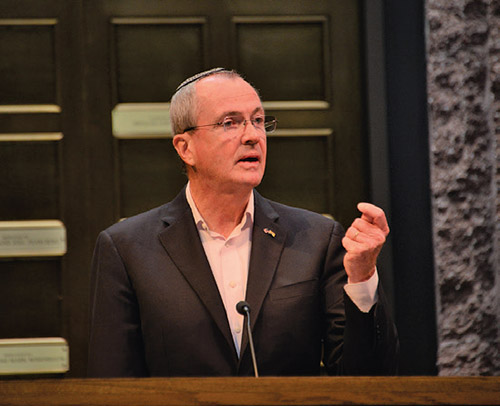


Over 2,000 people gathered at Livingston’s Temple B’nai Abraham on Sunday morning to find comfort and show their solidarity with Jews nationwide. The rally came in the wake of the deadly shooting Shabbat morning at a synagogue in Pittsburgh that left 11 people dead.
Calling it an “utterly somber moment,” Rabbi Clifford Kulwin, religious leader of Temple B’nai Abraham, told those in attendance that “we hope to find solace in our mourning” and “purpose as we unite in our outrage.”
Speaking just days after returning from a visit to Israel, New Jersey Governor Phil Murphy said that the attack at Tree of Life synagogue in Pittsburgh cannot be seen as an isolated incident. “Anti-Semitism is on the rise, not just in Europe, but in this nation.”
Quoting statistics from the Anti-Defamation League, the governor said anti-Semitism rose nearly a third from 2016 to 2017.
“We must find a way through courage and tears to stop the hate,” said Gov. Murphy. He went on to say that people must challenge hate wherever it lurks and wherever it is spoken, even at the highest levels of the nation. The governor received rousing applause when he said that he would be looking at gun laws in the state.
Addressing the crowd, Dov Ben-Shimon, CEO of the Jewish Federation of Greater MetroWest, said that Federation will be lobbying for more state and federal aid to improve security measures at Jewish institutions.
Speaking with The Jewish Link, Ben-Shimon said, “This rally was a testament to the grief, sorrow and outrage that so many of us felt, that we came together so quickly. We stand in outrage and shock at the devastating tragedy that occurred in Pittsburgh and we stand in solidarity with our brothers and sisters in the Pittsburgh Jewish community.”
He continued, “We are incredibly grateful to our local police forces and sheriffs’ departments and to the law enforcement community, and we remind all synagogues, agencies and institutions of our Jewish community to increase their vigilance and communication with their local police and with Federation. As a community we stand together, and no institution should feel alone at this time.”
Those who came to the rally were from different towns, of different ages and of different faiths.
Sixteen-year-old Hannah Stepak of Randolph attended the event with her mother, Brenda. A member of the Teen Task Force for Common Sense Gun Control, a program of Federation’s community relations committee, Stepak said, “I just feel like we can’t keep letting this stuff happen, people being killed for no reason.”
Some people in the audience were offended when others brought politics into the discussion, believing it to be inappropriate at a solidarity rally.
“Why should this be partisan? That’s not what this day was about,” said a Livingston resident who left early in protest.
Rabbi Eliezer Zwickler, spiritual leader of Cong. AABJ&D in West Orange, commented, “We are once again reminded of the fragility of life, and the reason every day must be full of meaning. I think there is another unique and humbling message that is found within this awful situation. So often as people we disagree with others who may not see the world as we do. Our disagreements at times become heated, and personal. A tragedy like this reminds us that we can never allow our disagreements to divide us, we are members of the same family. We don’t always have to agree, but we do have to strive to see the good in our brethren.”
And that good extended beyond the Jewish world. There were those who came simply because they felt it was the right thing to do, like Bowie Snodgrass, the assistant rector at Christ Church in Short Hills, who attended the event with her husband and two young children, ages 1 and 8.
“I came out because I was heart sick yesterday,” said Snodgrass. “It’s important for us to band together.”
For those who wish to assist the Tree of Life community in its time of mourning and healing, please visit this link provided by the Jewish Federation of Greater Pittsburgh: https://jewishpgh.org/our-victims-of-terror-fund/. Funds collected will be earmarked for psychological services, support for families, general services, reconstruction, additional security throughout the community and medical bills for those involved, as well as counseling and other services that may prove necessary in the future.
By Faygie Holt
�










